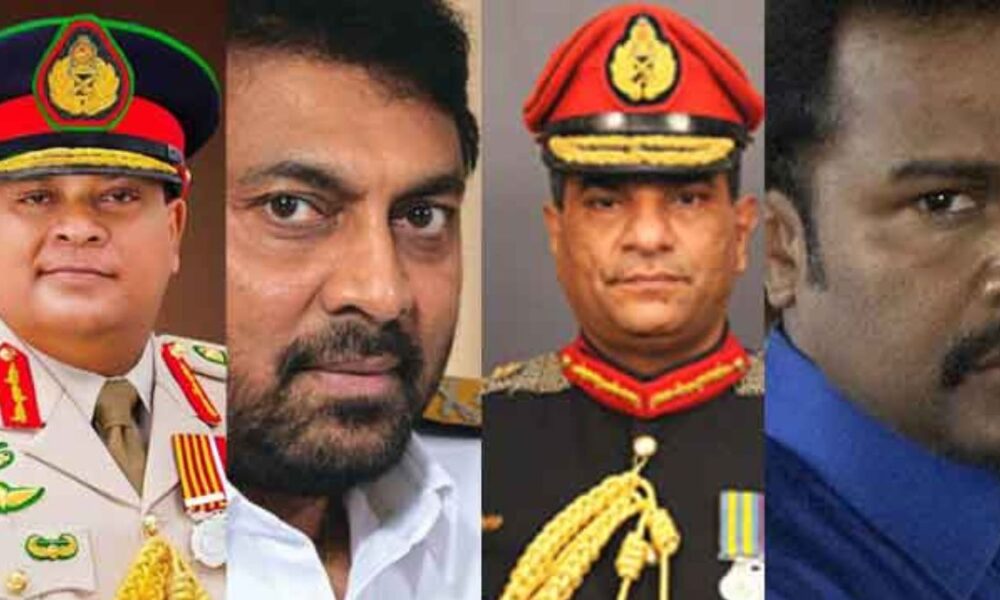-By Political Correspondent

(Lanka-e-News -01.April.2025, 11.10 PM) Field Marshal Sarath Fonseka, the decorated war hero who played a pivotal role in ending Sri Lanka’s internal conflict, has made a resolute statement: human rights violators within the Sri Lankan military should be held accountable without exception. His remarks come in the wake of the United Kingdom’s decision to impose targeted sanctions on four individuals accused of human rights abuses—three Sri Lankan military officials and one former LTTE leader turned government proxy.
These sanctions, announced on March 24, 2025, under the UK’s Global Human Rights Sanctions Regulations 2020, specifically target former senior military officials Shavendra Silva, Jagath Jayasuriya, and Wasantha Karannagoda, as well as ex-paramilitary leader Vinayagamoorthy Muralitharan (Karuna). Measures include asset freezes and travel bans, effectively barring them from entering the UK or accessing British financial systems.
Fonseka’s message is clear: the involvement of these individuals in alleged human rights violations should not be dismissed as mere collateral damage of war. He has firmly stated that any military official who abused their position to commit crimes should be held accountable.
Among those sanctioned, Admiral of the Fleet Wasantha Karannagoda stands accused of involvement in the abduction and disappearance of 11 Tamil youths, who were allegedly held at a naval base in Trincomalee. One of these students was reportedly preparing to leave for higher studies in the UK before his abduction. These cases serve as stark reminders to the international community that justice must be served.
Fonseka also recalled that the Sri Lankan military had, on several occasions, taken internal action against individuals who had committed crimes, reinforcing the army’s commitment to protecting its reputation, dignity, and adherence to the law.
Fonseka himself has not been immune to the global scrutiny surrounding Sri Lanka’s wartime conduct. He revealed that his U.S. Green Card was revoked due to his role as a commander in the Sri Lankan military during the conflict. Furthermore, he recounted an incident where he was advised by the UK High Commission not to apply for a visa to attend an environmental conference due to his past military involvement. These experiences highlight how Sri Lanka’s military figures—regardless of their stature—are not beyond international accountability.
The imposition of UK sanctions signals a growing international commitment to addressing human rights violations. Tamil diaspora groups and human rights organizations have welcomed these measures, viewing them as a long-overdue step toward justice. Many argue that the Sri Lankan government has failed to prosecute those responsible for wartime atrocities, thereby necessitating external pressure.
The broader question remains: will these sanctions serve as a wake-up call for Sri Lanka’s political and military elite, or will they be dismissed as another round of foreign interference?
Fonseka’s remarks were not just directed at the international community but also served as a stern warning to his colleagues in the Sri Lankan military. He emphasized that military service and sacrifice do not exempt individuals from legal accountability. While acknowledging the sacrifices of soldiers—many of whom are now disabled—he insisted that they must operate within the bounds of the law.
His statement, “No matter the sacrifices made, once you go above the law, you must face justice,” reinforces his stance that military personnel cannot claim impunity under the guise of national duty.
Sri Lanka stands at a crossroads in its post-war trajectory. The country has long struggled to address allegations of war crimes, often dismissing them as politically motivated attacks. However, the recent UK sanctions demonstrate that the international community remains invested in seeking justice for victims of wartime atrocities.
For Sri Lanka to move forward, there must be an internal reckoning. It is not enough to rely on the goodwill of the international community to address these issues. The Sri Lankan government and military must take decisive steps to ensure that justice is served within their own ranks. Failing to do so risks further international isolation and damages the nation’s standing on the global stage.
Field Marshal Sarath Fonseka’s statements are a call to action for both the Sri Lankan government and military. If the country is to uphold its dignity and credibility, it must demonstrate that it is serious about addressing human rights abuses.
The Sri Lankan military has a duty—not just to the nation, but to humanity—to ensure that no individual is above the law. The time for excuses is over. The world is watching, and justice must prevail.
-By Political Correspondent
---------------------------
by (2025-04-01 18:27:01)
Leave a Reply